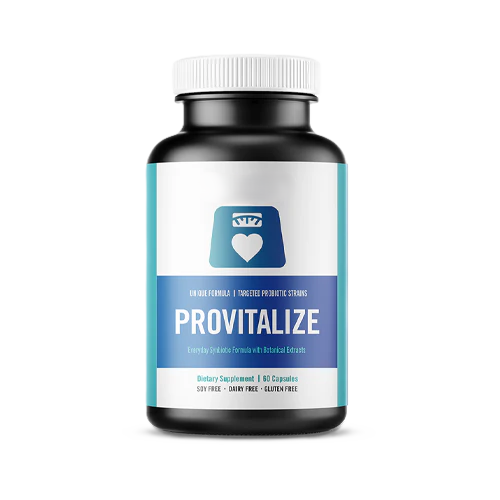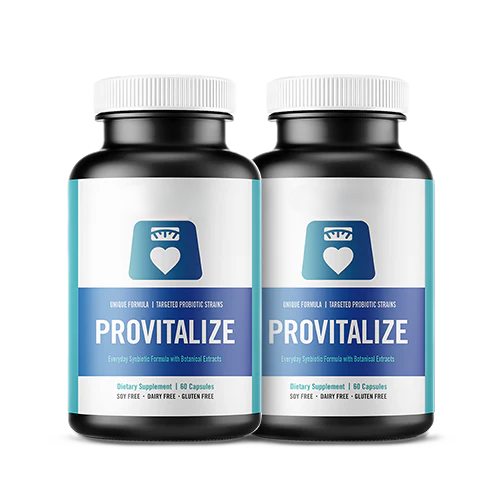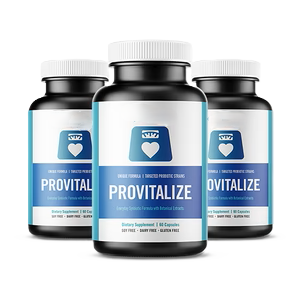As women pass the age of 40, the body begins a gradual shift toward menopause. Hormonal fluctuations, slower metabolism, changes in gut health, and an increased tendency to gain abdominal fat are all common occurrences. While hormone therapy and lifestyle shifts often top the list of solutions, one underappreciated tool is menopause-specific probiotics — probiotics tailored to support the microbiome changes that happen during this stage of life.
In this post, we’ll explore why women over 40 especially benefit from menopause probiotics, the scientific rationale, how they complement diet/exercise, and how a product like Provitalize is formulated to address these specific needs.
Hormonal Changes, Gut Health & the “Gut-Hormone Axis”
By the time a woman reaches her 40s, ovarian function gradually declines. Estrogen and progesterone levels fluctuate more erratically, eventually falling. These hormonal shifts influence gut motility, gut barrier integrity, and the balance of beneficial vs. harmful gut bacteria (i.e. microbiome composition).
- Reduced estrogen = altered gut microbiome: Lower estrogen has been linked with reduced microbial diversity and shifts toward more dysbiotic (less healthy) gut flora.
- Increased intestinal permeability (leaky gut): Hormonal stress and inflammation may compromise the gut barrier, leading to systemic inflammation, which in turn may exacerbate menopausal symptoms.
- Microbiome’s role in hormone recycling: Some gut bacteria produce enzymes (e.g. β-glucuronidase) that help recycle estrogens via the enterohepatic circulation. A healthy microbiome ensures efficient hormone recycling and clearance.
Because of all this interplay, supporting gut health is crucial during menopause — and provitalize probiotic is the no 1 choice to handle the pre and post menopause situation.
Why Probiotics Matter More After 40: Key Benefits
1) Support for Abdominal Fat & Metabolism
One of the biggest frustrations for women over 40 is the stubborn “menopause belly” — fat that accumulates centrally (around the midsection). Evidence suggests that certain probiotic strains (e.g., Lactobacillus gasseri SBT2055) may help reduce visceral fat.
A 12-week clinical study showed that participants consuming L. gasseri had significant reductions in visceral fat area, body weight, and waist circumference.¹ This is relevant because during menopause, estrogen decline often shifts fat storage toward the abdomen.
2) Improved Digestion, Bloating & Regularity
Slower digestion, bloating, gas, constipation — these are more common after 40. Probiotics help by:
- Enhancing breakdown of fiber and food residues
- Increasing production of short-chain fatty acids (SCFAs) that feed colon cells
- Suppressing overgrowth of gas-producing bacteria
- Restoring motility and regular bowel habits
Thus, women may feel less bloated and lighter overall.
3) Immune & Inflammatory Balance
Menopause is associated with increased systemic inflammation. A balanced gut microbiome plays a central role in calibrating immune responses.
Probiotics can:
- Reduce pro-inflammatory cytokines
- Lower lipopolysaccharide (LPS) translocation (a driver of metabolic endotoxemia)
- Strengthen gut barrier, reducing “leaky gut” driven inflammation
These effects may help mitigate joint aches, fatigue, mood instability, and general “inflammaging.”
4) Mood, Sleep, Brain & Cognitive Support
Emerging research on the gut-brain axis shows that gut microbes influence neurotransmitter production (serotonin, GABA) and inflammation— both relevant for mood, anxiety, and sleep.
Women in menopause often struggle with mood swings, brain fog, and sleep fragmentation. Probiotics may help regulate mood and cognition by reducing gut-derived inflammation and supporting healthy signaling between gut and brain.
Why the Generic Probiotic Isn’t Enough
Many probiotic supplements on the market are generic — offering standard strains like Lactobacillus acidophilus or Bifidobacterium animalis. But menopausal women have specific needs:
- Strain specificity matters: Not all strains assist in fat metabolism or hormone-associated changes.
- Delivery & survivability: Delayed-release capsules or acid-resistant coatings ensure strains survive stomach acid.
- Supporting ingredients: Some formulations include herbs or absorption enhancers (e.g. curcumin, black pepper extract) to address menopausal inflammation.
That’s where menopause probiotic blends come in. For instance, Provitalize is crafted specifically for women during perimenopause and menopause, integrating lab-verified probiotic strains with botanical compounds to support gut, hormonal, and metabolic balance. (You can also have a look at provitalize Ingredients.)
How to Use Provitalize Menopause Probiotic For Better Results
To get the most from menopause probiotics, combine them with supportive habits:
Dosage and Timing
Take the recommended dose daily (for Provitalize, that’s 2 capsules), ideally in the morning with a glass of water. Consistency is key.
Diet & Prebiotics
Feed your probiotics. Prioritize fiber-rich foods (e.g. vegetables, legumes, oats), resistant starches, and fermented foods. A complementary prebiotic supplement (when safe) can amplify effects.
Movement & Strength Training
Resistance training, walking, and HIIT improve insulin sensitivity and muscle retention. The probiotics help your body make better use of nutrients.
Sleep, Stress Management & Recovery
Poor sleep and chronic stress disrupt gut health. Incorporate mindfulness, relaxation, and adequate rest.
Avoiding Gut Disruptors
Minimize use of unnecessary antibiotics, NSAIDs, processed foods, excess sugars, and artificial sweeteners — all of which can disturb gut balance.







